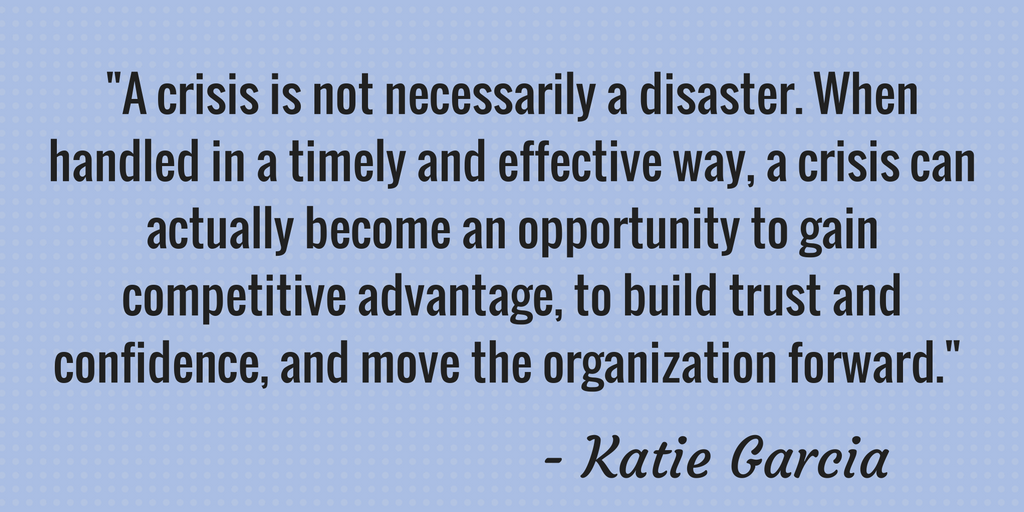 his week's Thursday feature is an interview with Katie Garcia, the founder and president of Athene Strategies, a strategic and crisis communications consulting firm. I asked Katie a series of questions about an important topic for any fundraiser, how to communicate with your constituents during an organizational crisis. 1) When a non-profit organization finds that it is in the midst of a crisis, what is the first steps that the staff should take? The first step that an organization needs to make when in a crisis is to recognize that a crisis is occurring. When people think of crises, often times they think of the effects of poorly handled crises – they think of organization disasters. But a crisis is not necessarily a disaster. A crisis is a time when an organization is unable to operate normally. When handled poorly, a crisis can lead to a loss of trust and confidence in those who matter most and cause reputational harm. But when handled in a timely and effective way, a crisis can actually become an opportunity to gain competitive advantage, to build trust and confidence, and move the organization forward in achieving its goals. So the first step is to recognize when an organization is or will soon not operating normally. The second step is to clearly identify what the crisis is. Crises are organizational problems, not simply communication problems. Communication in and of itself is not enough to end a crisis. (Communication can exacerbate a crisis or organizational problem though). If you do not identify where the actual problem lies, you will not be able to respond in a way that will effectively end the crisis. Therefore, you need to clearly identify what the organizational problem is before you respond to the crisis. The third step is to decide how to respond to the crisis by asking and answering the following question: What would reasonable people appropriately expect a responsible organization to do when faced with this? This question is important. It is not asking what it is that an organization wants to say. That is self-indulgent. And while it might make an organization feel good, it will not move those who matter most to continue to support with the organization. Rather, the right question focuses on what the people who matter most – an organization’s stakeholders – would reasonably expect a responsible organization to do. And if an organization asks and answers this question, and then responds based on that answer in a timely way, an organization can end the crisis, increase trust and confidence in the organization, and get back to operating normally. 2) Is there any difference in how you handle a controversy versus a crisis with respect to communication? A controversy may or may not become a crisis. A controversy is a matter of public dispute, debate or disagreement. If a controversy gets to the point where the organization can no longer operate normally, then the response would be the same as for a crisis—to ask and answer the question: What would reasonable people appropriate expect a responsible organization to do when faced with this? And depending on what the crisis is, the response will differ based on the answer to that question. But the process is the same as with every crisis. However, a controversy may not become a crisis. For example, in a university setting, a dispute over hiring a professor because of their identity or a change in a tuition model are not crises. In that case, a controversy could be an opportunity to showcase the mission, values, and work of the organization in a way that reaches a larger audience than the organization would otherwise be able to reach. But to do that effectively, an organization would need to think strategically about 1) what it wants to achieve; 2) who the organization needs to reach to achieve that goal; and 3) what the organization wants that audience to think, feel, know or do in order to help achieve that goal. 3) What's your advice for fundraising during a crisis? Fundraising during a crisis needs approached in a strategic way. Whether or not and how to fundraise during a crisis will depend on what the crisis is and how the organization is responding to it. Sometimes, it may not be appropriate to fundraise during the crisis itself. For example, if the crisis revolves around an accusation that leadership have unethically or illegally handled their organization’s finances, fundraising before the crisis is resolved may not be appropriate and can actually exacerbate the crisis. Other times fundraising could be part of or support the crisis response. For example, if there is a natural disaster that affects those an organization serves or where the organization operates from, it could be that the organization fundraises specifically to address that need. When figuring out if and how to fundraise during a crisis, it will go back to the question of: What would reasonable people appropriately expect a responsible organization to do when faced with this? Fundraising during a crisis should be done in ways that are consistent with or in support of the crisis response and are appropriate given the circumstances of the crisis. 4) What are the best signs that the crisis is over? The key indication that a crisis is over is that the organization goes back to operating normally. If the crisis is handled well, that moment could happen right after the initial response. If an organization responds effectively right at the beginning, then the crisis may end before it really begins. The best handled crises are the ones that no one, outside the response team, knows about or noticed. But if the crisis is not handled well or in a timely enough way, or if the response involves some sort of shift within the organization – whether it be in personnel, leadership, or processes – it will likely take more time to get back to operating normally. And normal operations after the crisis may be different than what it was before the crisis. 5) What are your 3 favorite tips for handling the communication during a crisis? 1.) Take a deep breath and a step back. It is difficult when an organization you have devoted yourself to is in crisis. As human beings, it is in our nature to respond emotionally first when faced with a crisis. Whether it be with anger, confusion, sadness, panic, disbelief, denial – whatever you may be feeling, take a deep breath. And then another one. Find a way to stay calm. You will not be able to think clearly or respond effectively if you become consumed in your own feelings about what is happening. And then take a step back. Look objectively at the situation. See the whole board. Only then will you be prepared to respond to the crisis. 2.) Remember that leadership is not about you, it’s about who you serve. Leaders are charged with making decisions for the good of the organization. Sometimes that means doing or saying things that you may not be comfortable with or may not want to say or do. During a crisis, it is only too easy to get stuck in focusing or making decisions based on what you want to do, rather than what you need to do to fulfill the reasonable expectations of those who matter most to the organization. Remember when responding to a crisis that it is not about you or what you want – it is about your stakeholders. Leaders need to overcome the fear and inertia that leads to inaction in order to respond in timely and effective ways. 3.) Learn from past experience. We need to learn from past experience, both your own experience and the experience of others. In terms of crises, we can open any newspaper or watch any news program to witness what other organizations in crisis have done – decisions that either led to a crisis or decisions in how the organization responded to a crisis. Learn from these examples. They can guide you and organization as you answer that question of what reasonable people would appropriately expect a responsible organization to do when faced with this. What works for one organization may not work for another, but you can learn from other organizations. And in your own life, learn from your own experiences of facing crises. Learn from past crises in your life and the organization. What worked? What didn’t work? What could you or the organization have done differently? Let those past examples also guide you as you encounter crises or potential crises in your organization so that you can respond in timely and effective ways. More about Katie Garcia: Katie Garcia is the founder and president of Athene Strategies, a strategic and crisis communications consulting firm. For more than 10 years, Ms. Garcia has worked in the field of strategic and crisis communication and leadership development. During this time, she has advised leaders and organizations across multiple sectors including non-profits, international and national NGOs, religious institutions, educational institutions, political action campaigns, inter-governmental organizations, and small businesses. Ms. Garcia has trained and advised leaders and emerging leaders across sectors to improve their ability to communicate effectively in their positions of leadership. Prior to founding her firm, she served as Interim Communication Consultant for the Starr King School for the Ministry and Communications Consultant for Religions for Peace. She has also worked in organizations such as Freedom to Marry, Disaster Chaplaincy Services, and Logos Consulting Group. Hi! It's Jessica. I draw on the concepts that Katie presents in this article in my webinar presentation titled Fundraising in a Crisis. This webinar will launch Wednesday 3/18/20 for free as a resource for nonprofits to respond to the COVID-19 crisis. You can register here: www.realdealfundraising.com/crisiswebinar. 8/4/2017 01:34:25 pm
I see a crisis as an opportunity to improve. We may not see it at the moment, but we can learn from the bad things that come our way. There is always something new to be learned about our journey. We only have to think positively and analyze carefully. This is another way of saying, using our mind to face our problems. 9/20/2017 07:31:40 am
When you have an online business manager on your team, one of her primary responsibilities might be to partner with you to create your overall marketing strategy. That includes everything from brainstorming to campaign planning to hiring contractors to execute creative, setting up response tracking metrics, and so on. Comments are closed.
|
Jessica Cloud, CFREI've been called the Tasmanian Devil of fundraising and I'm here to talk shop with you. Archives
June 2024
Categories
All
|


 RSS Feed
RSS Feed
